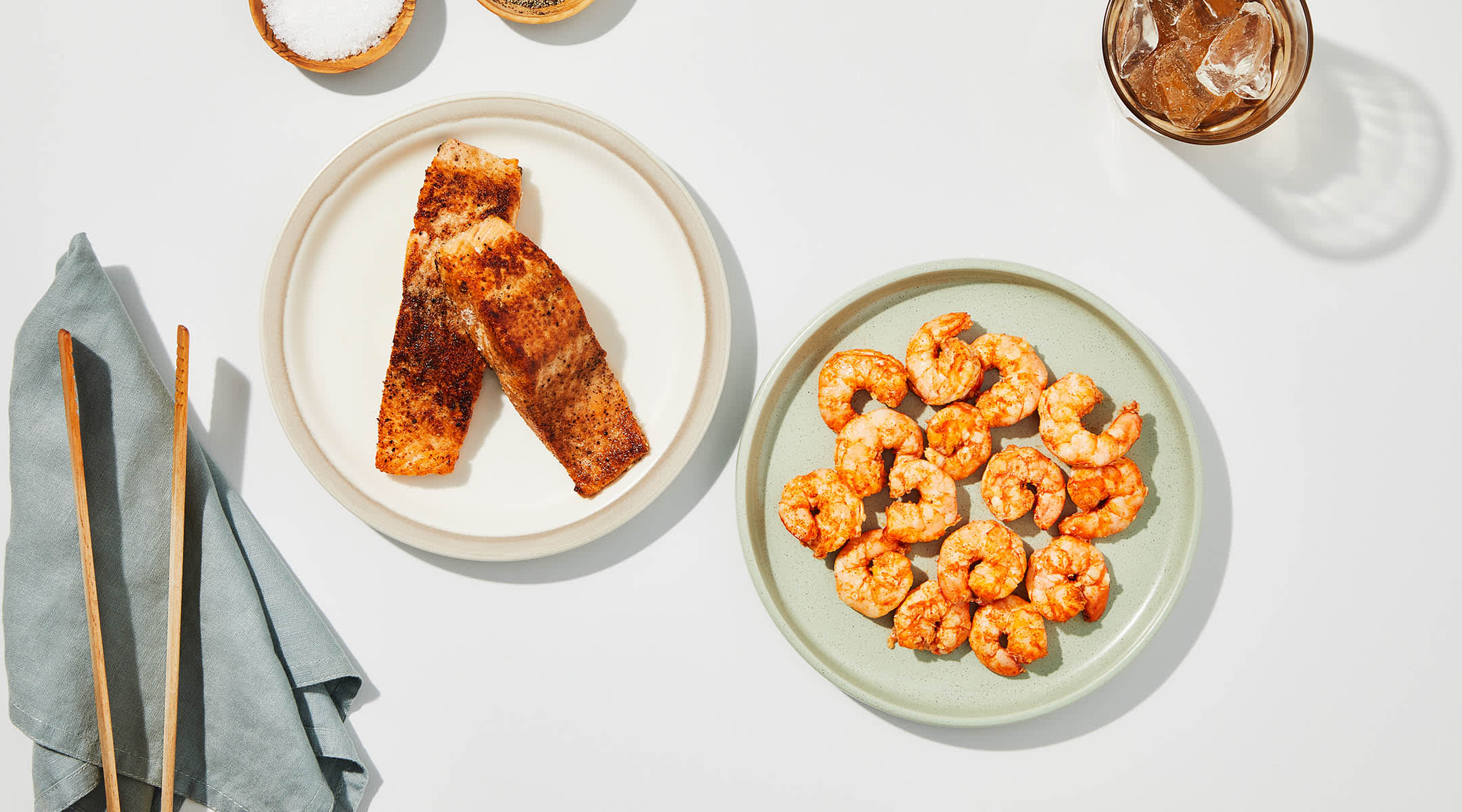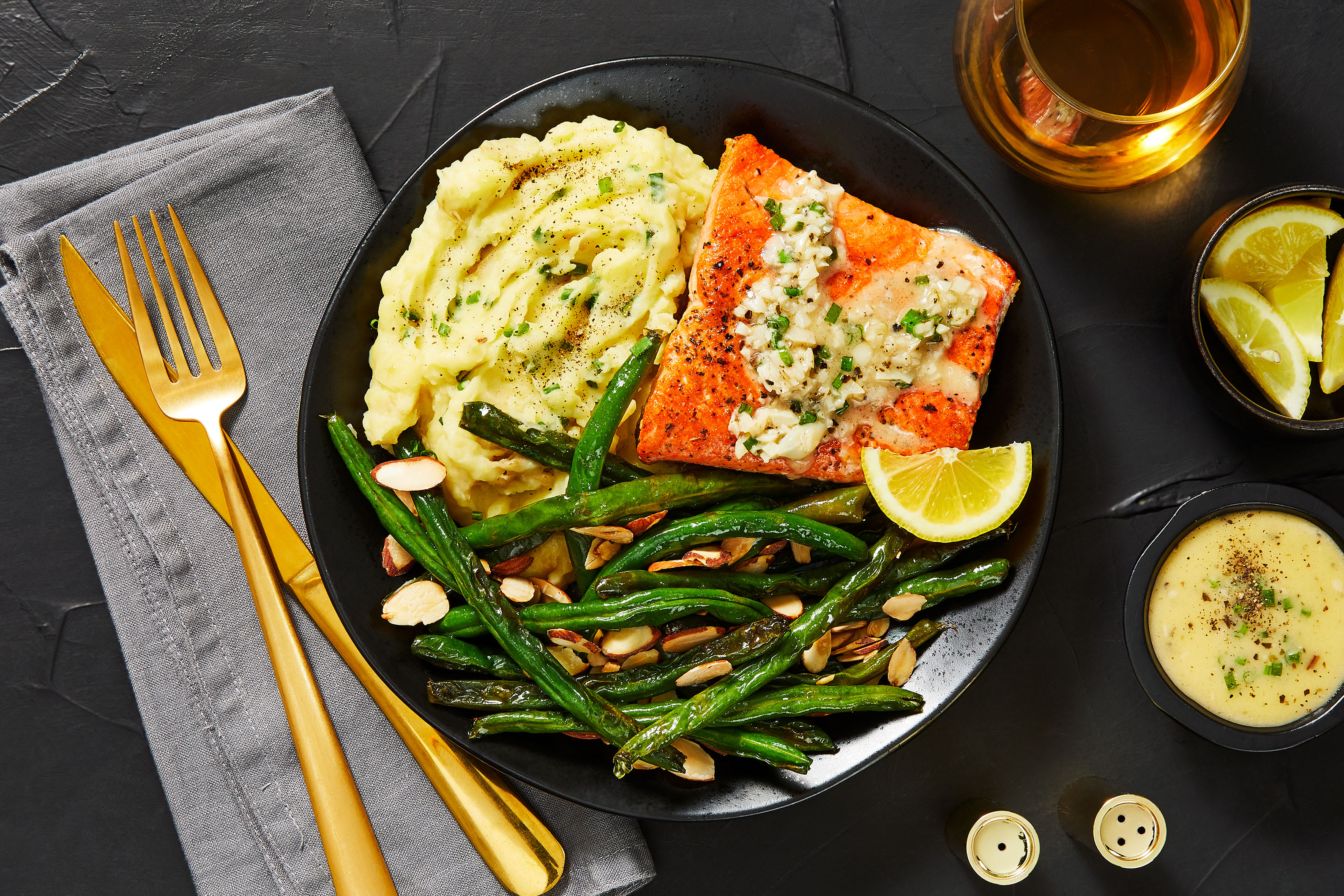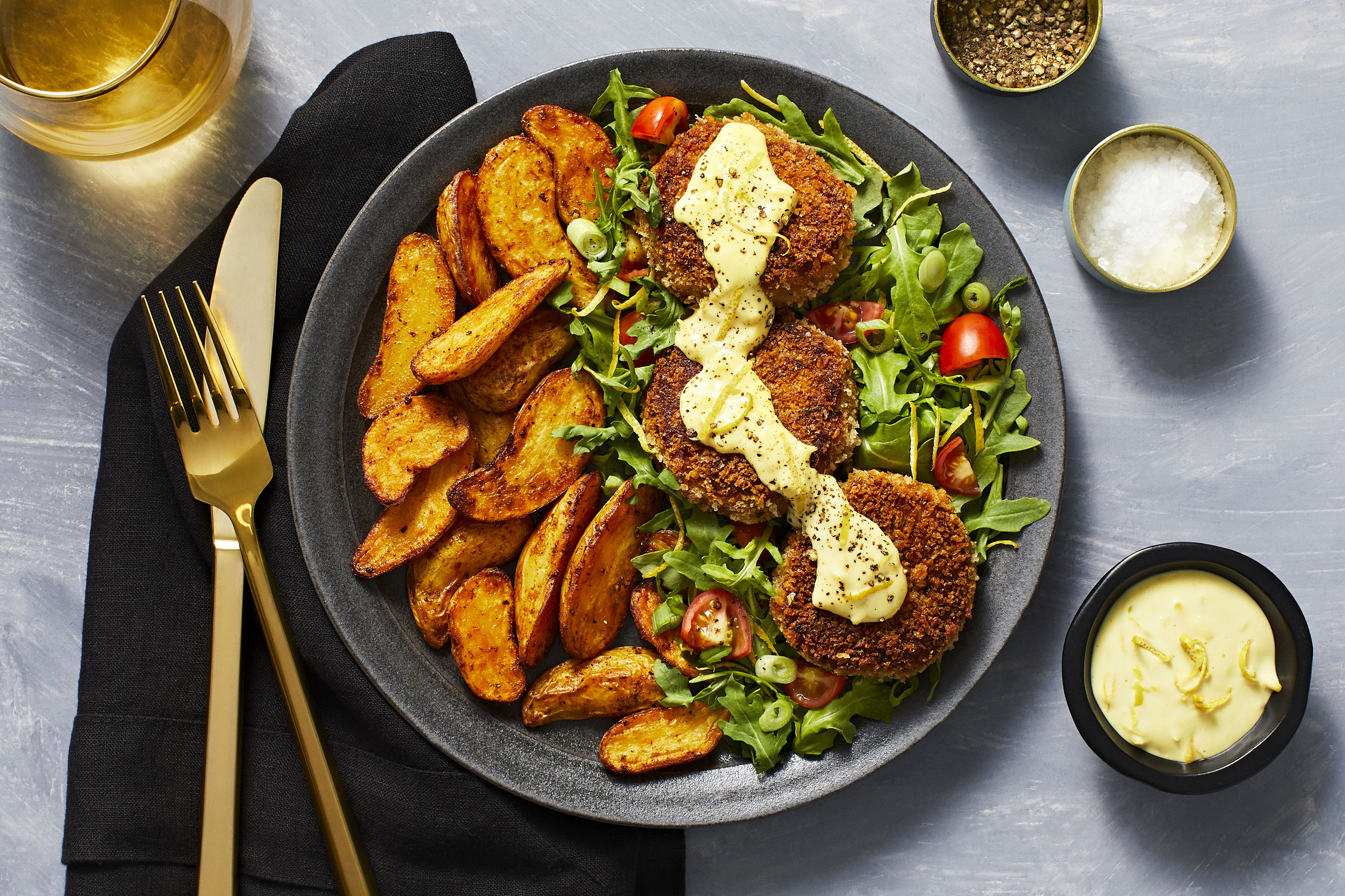What Is a Pescatarian Diet?
What Is a Pescatarian Diet?
Have you ever wondered about the buzz around the pescatarian diet? It's more than just a trend — it's a lifestyle choice that's gaining momentum for its balanced approach to eating.
At HelloFresh, we're all about embracing diverse dietary preferences, and the pescatarian diet is no exception. This unique diet combines the richness of plant-based foods with the wholesome goodness of seafood, offering a delightful and nutritious eating experience. It's a path we proudly support with our versatile meal plans designed to cater to the nuances of this lifestyle.
Whether you're a seasoned pescatarian or just curious, our pescatarian meal kit menu has something special for everyone, ensuring each meal is as enjoyable as it is beneficial. So, let's dive into the ocean of possibilities that a pescatarian diet offers and see how it can be a part of your daily routine.
What Exactly Is a Pescatarian Diet?
At its core, a pescatarian diet is a plant-forward way of eating that includes seafood. Think of it as a vegetarian diet with the addition of fish and shellfish.
This way of eating steers clear of red meat and poultry, instead focusing on the bounty of the sea combined with plant-based staples like fruits, vegetables, legumes, and whole grains. It's a diet that offers the best of both worlds: the health benefits of a vegetarian lifestyle with the added nutritional punch of seafood.

Why Choose a Pescatarian Diet?
When you opt for a pescatarian diet, you're not just adding a splash of variety to your meals but also casting a net to catch some health benefits. It's a journey that balances taste with well-being, and here's why it's worth considering:Heart Health
The stars of this diet, fish like salmon, mackerel, and sardines, are rich in omega-3 fatty acids. These nutrients are key players in maintaining heart health. They help in managing cholesterol levels, which is a significant step in supporting overall health and the health of your heart.
Weight Management
Weight management is another perk of this diet. Seafood and plant-based meals tend to be lower in calories and unhealthy fats than their red meat counterparts. Plus, the high content of lean proteins from fish and legumes can leave you feeling satisfied longer.
Nutritional Value
Leafy greens and whole grains deliver fiber and iron, while seafood offers up vitamin B12 and calcium. Consider this diet a well-orchestrated team, with each nutrient playing a vital role in maintaining your body's optimal health.
Flavorful Variety
Let's not forget the sheer joy of eating. This diet offers an exciting range of flavors and textures. It's a culinary exploration, from the zest of Mediterranean cuisines to the comfort of homemade vegetarian dishes.
Sustainability
Choosing a pescatarian diet is not just a personal health choice but also a step toward environmental sustainability. Seafood, especially when sourced responsibly, has a lower ecological footprint than meat production. It's about enjoying your meals while also respecting our planet.
Cognitive and Mental Wellness
The benefits of a pescatarian diet extend beyond physical health. The omega-3 fatty acids found in fish are also known to support cognitive functions. Incorporating fish into your diet can be a step toward maintaining brain health and overall mental wellness.
Blood Pressure and Sugar Levels
The combination of healthy fats, lean proteins, and nutrients found in a pescatarian diet can also help in maintaining healthy blood pressure and blood sugar levels. This is particularly beneficial in supporting a healthy metabolic system.

What Can You Eat on a Pescatarian Diet?
Now that you're acquainted with the benefits a pescatarian diet offers, let's set sail into the world of foods that make up this popular diet.Seafood
First and foremost, seafood is the star of the pescatarian diet. This includes a diverse range of fish, from mackerel and sardines' oily richness to swordfish and tilapia's lean elegance. Shellfish like clams, scallops, and shrimp also play a pivotal role, offering variety and a burst of flavors.
Veggies
The pescatarian diet is deeply rooted in plant-based eating, so vegetables are a mainstay. This includes everything from leafy greens and crunchy veggies to sweet, ripe fruits. They're not just side dishes but are integral to creating balanced, colorful meals.
Legumes and Grains
Legumes like lentils, chickpeas, and various beans are excellent plant-based protein sources. They pair wonderfully with whole grains such as quinoa, brown rice, and barley, making for hearty and satisfying meals. These ingredients are fantastic for adding texture and depth to your dishes.
Dairy and Eggs
For those who include them, dairy products and eggs can be part of a pescatarian diet, offering additional sources of protein and calcium. Whether it's a sprinkle of cheese over a veggie-packed omelet or a dollop of Greek yogurt on a bowl of fresh fruit, these foods can add a creamy, rich dimension to your meals.
Nuts and Seeds
Let's not forget the small but mighty nuts and seeds. Almonds, chia seeds, and flaxseeds are just a few examples that pack a punch of nutrients, including essential fats and proteins. They're perfect for snacking or as additions to salads and breakfast bowls.
Herbs and Spices
To bring your pescatarian dishes to life, herbs and spices are your best friends. They add a burst of flavor without the need for extra fats or calories. Think fresh basil in a tomato salad, dill with grilled fish, or a sprinkle of cinnamon on your morning oatmeal.

How Does the Pescatarian Diet Compare to Other Diets?
In the world of healthy eating, the pescatarian diet stands out as a unique blend of flavors and benefits. But how does it stack up against other popular diets?
Understanding these differences can help you decide if the pescatarian path aligns with your lifestyle and health goals.
Pescatarian vs. Vegetarian Diet
Both diets share a deep appreciation for plant-based foods, but the pescatarian diet casts a wider net by including seafood. While vegetarians turn away from meat and fish, pescatarians welcome the nutritional benefits of fish and shellfish.
If you're looking to reel in some extra nutrients while still enjoying a mostly plant-based diet, pescatarian is your catch of the day.
Pescatarian vs. Vegan Diet
Vegans commit to a lifestyle that excludes all animal products, making a strong statement for animal rights and environmental concerns. However, pescatarians dip their toes into animal products, enjoying the health benefits of seafood while still focusing on plant-based foods.
If you’re not ready to completely dive into veganism but want to embrace a sustainable, health-focused diet, the pescatarian path offers a balanced route.
Pescatarian vs. Mediterranean Diet
Mediterranean diet enthusiasts enjoy a feast of fruits, vegetables, whole grains, and a good splash of olive oil, similar to pescatarians. However, the Mediterranean diet typically includes a wider variety of animal proteins in moderation. Pescatarians, on the other hand, stick to seafood as their primary animal protein source.
Both diets are heart-healthy, but pescatarian is your go-to if you prefer a sea breeze over a land breeze in your dietary choices.
Pescatarian vs. Ketogenic Diet
Keto emphasizes high fat, moderate protein, and low carbs, often relying heavily on meats and dairy fats. In contrast, the pescatarian diet sails smoothly with whole grains, fruits, and legumes, advocating a more balanced approach to fats, proteins, and carbs.
How Do I Start a Pescatarian Diet?
Shifting to a pescatarian diet may feel like charting unfamiliar territories, especially if you're new to the lifestyle.
But don't worry, we've got your back — here are some tips to help you navigate smoothly:
Start with familiar favorites: Begin your pescatarian journey with seafood dishes you already love. If you're fond of salmon, try grilling it with a sprinkle of herbs. Love shrimp? Toss it into a pasta. Starting with familiar flavors makes the transition more comfortable and enjoyable.
Learn about seafood servings: Understanding proper seafood servings can help in maintaining a balanced diet. The general guideline is two servings of fish per week, which can be a great way to ensure you're getting the right amount of omega-3 fatty acids without overdoing it.
Incorporate family-friendly meals: Make the diet a family affair. Pescatarian meals can be fun and engaging for everyone. Try having a taco night with fish as the star, or make a seafood pizza that the kids can help decorate.
Use meal kit services: For those who are always on the go, [meal prep services like HelloFresh](https://www.hellofresh.com/) can be a game-changer. We offer a pescetarian meal plan with recipes that are easy to prepare, ensuring you enjoy healthy, delicious meals without the stress of planning and shopping.
Gradually reduce red meat and poultry: If you're used to eating a lot of meat, gradually reduce your intake. Start by having “meatless Mondays” or “fish Fridays” to ease into the diet without feeling overwhelmed.
Be mindful of nutritional balance: While focusing on eating fish and plant-based foods, be mindful of getting a balanced mix of proteins, carbs, and fats. This balance is crucial for sustained energy levels and overall health.
Focus on sustainable choices: When selecting seafood, opt for sustainably sourced options to support environmental conservation. This choice ensures you’re contributing positively to the planet while enjoying your meals.
Monitor your progress: Keep an eye on how the diet affects your health and well-being. Many find that a pescatarian diet aids in weight management and overall vitality. Adjust your diet as needed to ensure it aligns with your health goals.
.jpg)
Meals To Enjoy on the Pescatarian Diet
We take pride in offering a diverse array of pescatarian meals that not only tantalize your taste buds but also align perfectly with your dietary preferences. Let's explore some of the delicious meals from our cookbook, along with a few additional ideas to enrich your pescatarian adventure:
Ginger lime salmon: Dive into our Ginger Lime Salmon with Scallion Rice & Roasted Sesame Broccoli. This dish features pan-seared salmon filets drizzled with a zesty ginger-lime sauce, complemented by fluffy scallion rice and crispy roasted broccoli sprinkled with sesame seeds. It's a flavor-packed meal that’s as nutritious as it is delicious.
Lemon herb shrimp pasta: Imagine succulent shrimp tossed in a light lemon-herb sauce, served over a bed of al dente pasta. This dish is a testament to the simplicity and elegance of pescatarian cuisine, offering a perfect balance of flavors.
Quinoa-stuffed bell peppers: These are not your average stuffed peppers. Filled with protein-rich quinoa, black beans, and a medley of vegetables and topped with a sprinkle of cheese, they're a hearty and satisfying plant-based option for those days when you want something a little different.
Considerations for a Pescatarian Diet
Embracing a pescatarian diet is a wonderful step toward a healthier lifestyle, but there are a few key considerations to keep in mind.
Firstly, it's essential to ensure a balanced intake of nutrients. While seafood is rich in omega-3 fatty acids and protein, it's crucial to pair it with a variety of plant-based foods for a well-rounded diet.
Be mindful of mercury levels in certain fish, like swordfish and king mackerel, especially for pregnant women and young children. Opting for lower-mercury fish such as salmon, tilapia, and cod can be a safer choice.
Secondly, sustainability is an important aspect of a pescatarian diet. Make informed choices by selecting responsibly sourced and certified seafood, helping support ocean health and fish populations.
Lastly, while the pescatarian diet is generally seen as a healthy option, individual dietary needs and health conditions should always be considered. Consulting with a nutritionist or healthcare provider can help tailor the diet to your specific requirements, ensuring you get the most benefit from this lifestyle change.
By keeping these considerations in mind, you can enjoy the full array of benefits offered by the pescatarian diet while also contributing positively to environmental sustainability.